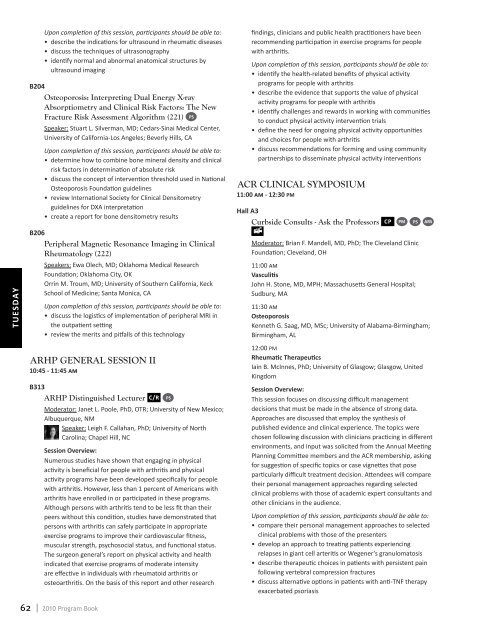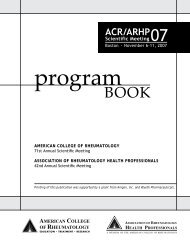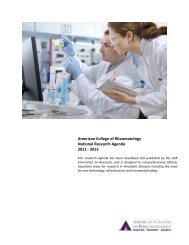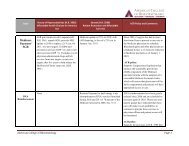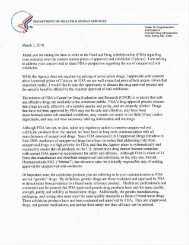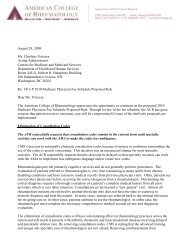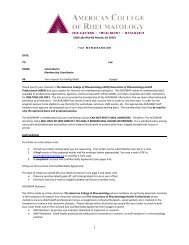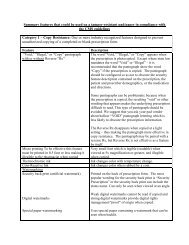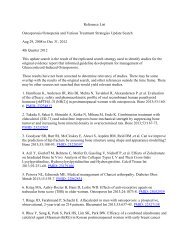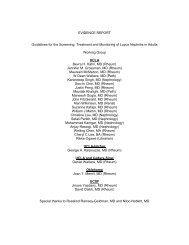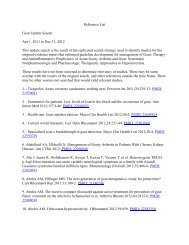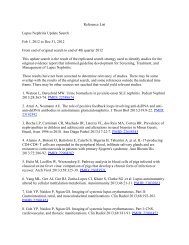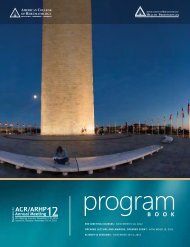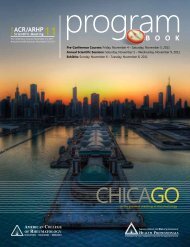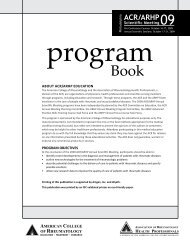B O O K - American College of Rheumatology
B O O K - American College of Rheumatology
B O O K - American College of Rheumatology
You also want an ePaper? Increase the reach of your titles
YUMPU automatically turns print PDFs into web optimized ePapers that Google loves.
tuesday<br />
Upon completion <strong>of</strong> this session, participants should be able to:<br />
• describe the indications for ultrasound in rheumatic diseases<br />
• discuss the techniques <strong>of</strong> ultrasonography<br />
• identify normal and abnormal anatomical structures by<br />
ultrasound imaging<br />
B204<br />
Osteoporosis: Interpreting Dual Energy X-ray<br />
Absorptiometry and Clinical Risk Factors: The New<br />
Fracture Risk Assessment Algorithm (221) PS<br />
Speaker: Stuart L. Silverman, MD; Cedars-Sinai Medical Center,<br />
University <strong>of</strong> California-Los Angeles; Beverly Hills, CA<br />
Upon completion <strong>of</strong> this session, participants should be able to:<br />
• determine how to combine bone mineral density and clinical<br />
risk factors in determination <strong>of</strong> absolute risk<br />
• discuss the concept <strong>of</strong> intervention threshold used in National<br />
Osteoporosis Foundation guidelines<br />
• review International Society for Clinical Densitometry<br />
guidelines for DXA interpretation<br />
• create a report for bone densitometry results<br />
B206<br />
Peripheral Magnetic Resonance Imaging in Clinical<br />
<strong>Rheumatology</strong> (222)<br />
Speakers: Ewa Olech, MD; Oklahoma Medical Research<br />
Foundation; Oklahoma City, OK<br />
Orrin M. Troum, MD; University <strong>of</strong> Southern California, Keck<br />
School <strong>of</strong> Medicine; Santa Monica, CA<br />
Upon completion <strong>of</strong> this session, participants should be able to:<br />
• discuss the logistics <strong>of</strong> implementation <strong>of</strong> peripheral MRI in<br />
the outpatient setting<br />
• review the merits and pitfalls <strong>of</strong> this technology<br />
findings, clinicians and public health practitioners have been<br />
recommending participation in exercise programs for people<br />
with arthritis.<br />
Upon completion <strong>of</strong> this session, participants should be able to:<br />
• identify the health-related benefits <strong>of</strong> physical activity<br />
programs for people with arthritis<br />
• describe the evidence that supports the value <strong>of</strong> physical<br />
activity programs for people with arthritis<br />
• identify challenges and rewards in working with communities<br />
to conduct physical activity intervention trials<br />
• define the need for ongoing physical activity opportunities<br />
and choices for people with arthritis<br />
• discuss recommendations for forming and using community<br />
partnerships to disseminate physical activity interventions<br />
ACR Clinical Symposium<br />
11:00 am - 12:30 PM<br />
Hall A3<br />
Curbside Consults - Ask the Pr<strong>of</strong>essors<br />
cP PM PS ARS<br />
Moderator: Brian F. Mandell, MD, PhD; The Cleveland Clinic<br />
Foundation; Cleveland, OH<br />
11:00 am<br />
Vasculitis<br />
John H. Stone, MD, MPH; Massachusetts General Hospital;<br />
Sudbury, MA<br />
11:30 am<br />
Osteoporosis<br />
Kenneth G. Saag, MD, MSc; University <strong>of</strong> Alabama-Birmingham;<br />
Birmingham, AL<br />
ARHP General Session II<br />
10:45 - 11:45 am<br />
B313<br />
ARHP Distinguished Lecturer c/r PS<br />
Moderator: Janet L. Poole, PhD, OTR; University <strong>of</strong> New Mexico;<br />
Albuquerque, NM<br />
Speaker: Leigh F. Callahan, PhD; University <strong>of</strong> North<br />
Carolina; Chapel Hill, NC<br />
Session Overview:<br />
Numerous studies have shown that engaging in physical<br />
activity is beneficial for people with arthritis and physical<br />
activity programs have been developed specifically for people<br />
with arthritis. However, less than 1 percent <strong>of</strong> <strong>American</strong>s with<br />
arthritis have enrolled in or participated in these programs.<br />
Although persons with arthritis tend to be less fit than their<br />
peers without this condition, studies have demonstrated that<br />
persons with arthritis can safely participate in appropriate<br />
exercise programs to improve their cardiovascular fitness,<br />
muscular strength, psychosocial status, and functional status.<br />
The surgeon general’s report on physical activity and health<br />
indicated that exercise programs <strong>of</strong> moderate intensity<br />
are effective in individuals with rheumatoid arthritis or<br />
osteoarthritis. On the basis <strong>of</strong> this report and other research<br />
12:00 PM<br />
Rheumatic Therapeutics<br />
Iain B. McInnes, PhD; University <strong>of</strong> Glasgow; Glasgow, United<br />
Kingdom<br />
Session Overview:<br />
This session focuses on discussing difficult management<br />
decisions that must be made in the absence <strong>of</strong> strong data.<br />
Approaches are discussed that employ the synthesis <strong>of</strong><br />
published evidence and clinical experience. The topics were<br />
chosen following discussion with clinicians practicing in different<br />
environments, and input was solicited from the Annual Meeting<br />
Planning Committee members and the ACR membership, asking<br />
for suggestion <strong>of</strong> specific topics or case vignettes that pose<br />
particularly difficult treatment decision. Attendees will compare<br />
their personal management approaches regarding selected<br />
clinical problems with those <strong>of</strong> academic expert consultants and<br />
other clinicians in the audience.<br />
Upon completion <strong>of</strong> this session, participants should be able to:<br />
• compare their personal management approaches to selected<br />
clinical problems with those <strong>of</strong> the presenters<br />
• develop an approach to treating patients experiencing<br />
relapses in giant cell arteritis or Wegener’s granulomatosis<br />
• describe therapeutic choices in patients with persistent pain<br />
following vertebral compression fractures<br />
• discuss alternative options in patients with anti-TNF therapy<br />
exacerbated psoriasis<br />
62<br />
2010 Program Book


